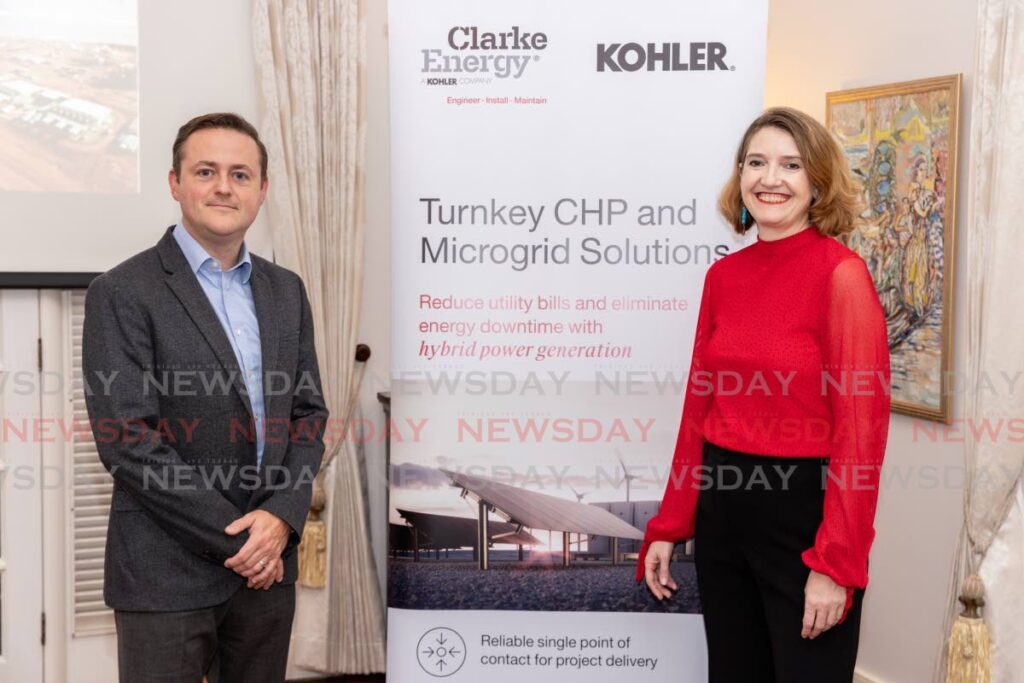Getting the best out of energy with Clarke

Despite the world’s push to transition to clean energy and reduce the world’s carbon emissions, fossil fuels such as natural gas are going to be around for a while. Natural gas in particular is considered a transition fuel which will take people from fossil to renewable energy with the lowest carbon footprint.
Using natural gas reserves at their highest efficiency would then be best for TT, which uses natural gas for power and energy as well as manufacturing several petrochemicals for export.
This is where Clarke Energy sees itself as being beneficial to TT.
" (Because of) the fact that TT is a developing nation with an availability of gas, we can provide huge opportunities for energy efficiency for TT,” said Alex Marshall, group business development and marketing director of Clarke Energy. “You can do so much more with the energy that you have locally.”
Making best use of energy
Marshall said fossil fuels have a role to play in the short to mid-term and could be considered a transition fuel to go from fossil to renewable energy.
“If you bring in large amounts of solar and wind, you will still have to balance that energy with batteries or hydrogen, but there is certainly a transition point for natural gas.
“The important thing is that we use it efficiently,” he said. “It's important that we don’t waste it, and we don’t generate electricity with low efficiency and we take the opportunity to take the CO2 out of the equation.”
Clarke Energy is an award-winning global company that can engineer, install and maintain distributed energy solutions to maximise an area’s output from various forms of gas.
“We are talking about true gas, so bio gas, natural gas, hydrogen, as well as flare gas, which could be a waste product."
TT uses single-cycle gas turbines to generate energy. Natural gas is burnt and the heat energy is released and used to produce steam. The steam turns a turbine connected to an electrical generator which produces electricity.
Single-cycle turbines can generate from 100-300 MW of power, but in the process can lose a lot of energy through wasted heat emitted from the turbine. Turbines operate at somewhere around 30-40 per cent efficiency.
Marshall said Clarke Energy’s engines, although smaller than the turbines that TT currently uses, can deliver greater efficiency. They operate typically in the 1-100 MW size range but can operate at up to 90 per cent efficiency. He said this could be pivotal for TT, given its continuing search for energy reserves and its mature gas fields being used at the moment.
“If you have a centralised turbine, you will lose energy moving the electricity from point A to B. Then you have losses associated with not using the fuel.
"If you use the energy closer to the site of use, you can be about 40-45 per cent efficient. Then you can recover about 40 per cent of the thermal energy, which gives you 90 per cent efficiency,” he said.
He said the company's latest efficiencies could convert energy to nearly 100 per cent capacity with a combined generation system he described as a quad generation – which uses an advanced gas-engine power configuration to use all the energy possible and recover carbon dioxide from the exhaust.
“That is electricity, heat and cooling and CO2 recovery,” Marshall explained.
He said the company's CO2 recovery is closely linked to its bio gas upgrading services. Its engines process gas from sewage or landfills, separates the high levels of CO2 which come from the bio gas and turn it into renewable methane and food-grade bio CO2.
“We take the CO2, clean it to drinks-grade standards and use it in carbonations,” Marshall said.
These projects are currently done in New York and Northern Ireland.
Grow with us
While TT has a great opportunity to increase the energy output of its gas reserves, Clarke Energy has an opportunity to grow as a renewable energy company.
“We see the opportunity to grow,” Marshall said. “We historically have been in gas engines, but we see the future as different – it is more complex power-generation installations involving multiple generation and storage technologies.”
Clarke Energy believes its future is in making sure these generation and storage technologies are operated and dispatched at their optimum.
Marshall explained that while oil and gas sectors have been well established, energy efficiency and renewable energy sectors still have room to grow, as does TT.
“As the country becomes more developed and you recognise the value of the environment and your fuel that would be a benefit for business.”
Last Friday Marshall introduced Clarke Energy to several people in business, including leaders in the manufacturing, food and energy sectors, at an event at the residence of the British High Commissioner on Friday.
At the event, he said historically Clarke Energy's largest markets have been in the UK, France and Australia but it has expanded to countries in Africa and South Asia, including Bangladesh and India, and has also got into markets such as French Guiana, Martinique and Guadeloupe. It has recently broken into the US markets and has been trying to get into TT with the help of Troy Heeralal, director of business development and corporate services at Advance Tech Services Ltd.
Marshall said as a company focused on energy efficiency and renewable energy it may want to partner with other clean-energy companies already operating in TT.
“We may want to speak to these companies and use some of the content that they generate,” he said. “It depends on the market.”

Comments
"Getting the best out of energy with Clarke"